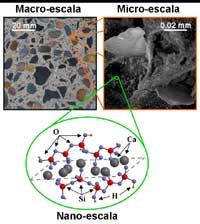Cement and sperm motility gain VII. Thesis Award
For the seventh consecutive year, the Basque Research website of the Elhuyar Foundation has organized the Thesis Prize. In this edition the three awards have been received by researchers from the University of the Basque Country. The first prize went to researcher Juan Jos Gaitero Redondo, for his work Doctor, I think my house has osteoporosis. From cement, the researcher compares in an attractive way the process of degradation of this material with bone osteoporosis or general demineralization of bones. It explains the process of degradation of cement and proposes the use of nanoparticles to mitigate it. In addition to the interesting topic, the researcher has used the comparison resource to make the topic attractive and has highlighted these two points when awarding the first prize to the work of the jury. Therefore, Juan Jos Gaitero has received a laptop and the possibility of spending a weekend in a rural house thanks to the collaboration of Sistek Informatics and Microsystems and Nekatur.

The second prize, as well as a special mention in Basque, went to the researcher of the same university Ekaitz Agirregoitia Marcos, for his work Opioideak eta kannabinoideak: the guardians of sperm mobility. The work revolves around the process of fertilization and the mobility of the associated sperm. As is known, to fertilize, sperm must reach there when the egg is ready, neither before nor after. The speed of sperm is controlled, among others, by internal opioids produced by the body and by internal cannabinoids. In this way, the sperm, depending on the type of opioids and cannabinoids found in the route of approach to the egg and its concentration, will increase or decrease the speed. Consequently, this work could facilitate in vitro fertilization of eggs. In relation to this summary, the jury stressed that writing is clean and clear, and that the core of the thesis is well explained. For this summary, Ekaitz Agirregoitia has won second place and the prize for the best summary produced in Basque. As a result, he has won a digital camera, a weekend in a farmhouse and an MP4 reader.
This year a total of 62 works have been submitted to the awards and for the first time theses have been approved from any area of study. Work has been received from the University of the Basque Country, University of Navarra, Public University of Navarra, Mondragon Unibertsitatea and University of Deusto. The jury highlighted the ability to choose the winning works to explain the core of the research in an attractive, informative and with an appropriate terminology. All the works submitted to the prizes can be consulted in the Thesis Competition section of the Basque Research website.
About the Thesis Prize
The Elhuyar Foundation organizes this award through the Basque Research website with the aim of attractively and understandably socializing the summaries of doctoral theses, that is, disseminating the research carried out at the university. Therefore, the jury does not judge the theses, but tries to integrate them in an attractive and understandable way.
The large number of works and the variety of topics that have been presented to the awards are reason for satisfaction. However, the jury has pointed out that when it comes to the outreach effort, there are some points to improve. In some cases, what has been done in the thesis is barely explained, and many times there have been too long entries and contexts. On the other hand, researchers often resort to academic writing, using a wide variety of terminologies and unexplained abbreviations. This makes reading difficult. Finally, the jury explained that some of the summaries have been overly descriptive. That is, the researchers have related a simple relationship of the tasks performed, and the judges consider that we have to work a little more on how to provide that information.
This year, the jury has rejected two papers, as references to third person researchers question whether the author of this summary is actually the researcher.
Buletina
Bidali zure helbide elektronikoa eta jaso asteroko buletina zure sarrera-ontzian








